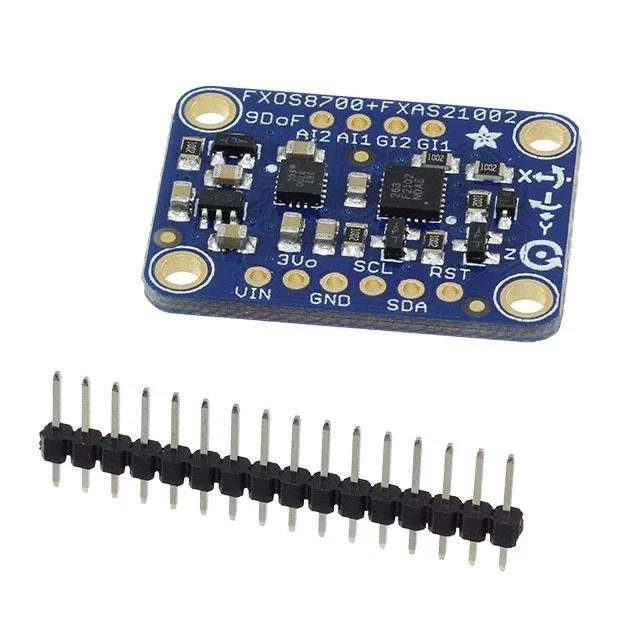Precision NXP 9-DOF breakout board - FXOS8700 + FXAS21002
| Referentie | ADA3463 |
|---|---|
| EAN code | 02069123995363 |
| Merk | ADAFRUIT |
| Zolang de voorraad strekt | Nee |
(C) www.adafruit.com - Only available in English
The NXP Precision 9DoF breakout combines two of the best motion sensors we've tested here at Adafruit: The FXOS8700 3-Axis accelerometer and magnetometer, and the FXAS21002 3-axis gyroscope.
These two sensors combine to make a nice 9-DoF kit, that can be used for motion and orientation sensing. In particular, we think this sensor set is ideal for AHRS-based orientation calculations: the gyro stability performance is superior to the LSM9DS0, LSM9DS1, L3GD20H + LSM303, MPU-9250, and even the BNO-055 (see our Gyro comparison tutorial for more details).
Compared to the BNO055, this sensor will get you similar orientation performance but at a lower price because the calculations are done on your microcontroller, not in the sensor itself. The trade off is you will sacrifice about 15KB of Flash space, and computing cycles, to do the math 'in house.'
To make it fast and easy for you to get started, we have a version of AHRS that we've adapted to work over USB or Bluetooth LE. Load the code onto your Arduino-compatible board and you will get orientation data in the form of Euler angles or quaternions! It will work on a ATmega328 (the fusion code is 15KB of flash) but faster/larger chips such as M0 or ESP8266 will give you more breathing room.
Each board comes with the two chips soldered onto a breakout with 4 mounting holes. While the chips support SPI, they don't tri-state the MISO pin, so we decided to go with plain I2C which works well and is supported by every modern microcontroller and computer chip set. There's a 3.3V regulator and level shifting on the I2C and Reset lines, so you can use the breakout safely with 3.3V or 5V power/logic. Each order comes with a fully assembled and tested breakout and a small strip of header. Some light soldering is required to attach the header if you want to use in a breadboard.
So what makes this so 'Precision'-y, eh?
This particular sensor combination jumped out at us writing the Comparing Gyroscopes learning guide since the FXAS21002 exhibited the lowest zero-rate level of any of the gyroscopes we've tested, with the the following documented levels (converted to degrees per second for convenience sake):
- At +/- 2000 dps 3.125 dps
- At +/- 250 dps 0.3906 dps
The zero-rate level is important in orientation since it represents the amount of angular velocity a gyroscope will report when the device is immobile. High zero-rate levels can cause all kinds of problems in orientation systems if the data isn't properly compensated out, and distinguishing zero-rate errors from actual angular velocity can be non-trivial. This is particularly important in sensor fusion algorithms where the gyroscope plays an important part in predicting orientation adjustments over time. A high zero-rate level will cause constant rotation even when the device is immobile!
By comparison, most other sensors tested have 10-20 times these zero-rate levels, which is why we consider this particular part very precise. There is little work to do out of the box to get useful, actionable data out of it.
TECHNICAL DETAILS
The NXP Precision 9DoF board consists of two separate ICs, described in detail below:
FXOS8700 3-Axis Accelerometer/Magnetometer
- 2-3.6V Supply
- ±2 g/±4 g/±8 g adjustable acceleration range
- ±1200 µT magnetic sensor range
- Output data rates (ODR) from 1.563 Hz to 800 Hz
- 14-bit ADC resolution for acceleration measurements
- 16-bit ADC resolution for magnetic measurements
FXAS21002 3-Axis Gyroscope
- 2-3.6V Supply
- ±250/500/1000/2000°/s configurable range
- Output Data Rates (ODR) from 12.5 to 800 Hz
- 16-bit digital output resolution
- 192 bytes FIFO buffer (32 X/Y/Z samples)
Datasheets, PCB CAD files, and Fritzing objects available in tutorial
Product Dimensions: 28.3mm x 20.5mm x 3.0mm / 1.1" x 0.8" x 0.1"
Product Weight: 2.1g / 0.1oz
* Ondanks een zeer uitgebreid voorraadsysteem, is het mogelijk dat de voorraadstatus niet overeenstemt met de actuele voorraad. Aarzel niet ons te contacteren, indien u zekerheid wenst over de beschikbaarheid.
** De weergegeven foto bij de producten kan verschillen van het eigenlijke product.

